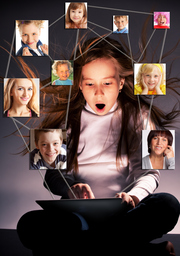How Social Media Is Making Kids Grow Up Too Fast
Many parents feel like their children are growing up too fast with the help of social media. Platforms like TikTok and Instagram give kids access to endless information and content. Kids today know more, but they are also at risk of encountering ideas that may affect the speed of their psychological and social development.
While some of the things they see aren’t necessarily harmful, the biggest question is how to ensure your young ones are interacting with content that is age-appropriate and conducive to their development. Here’s how social media is making children grow up too fast and what you can do about it.
Ways Social Media Making Kids Grow Up Too Fast
While helpful educational tools and people are producing interesting content that can benefit people of all ages, misinformation and dangerous content will inevitably abound in that same space. According to an All About Cookies survey, 50% out of 1,000 parents felt that the internet makes kids grow up too fast.
Here are a few examples of what kids are exposed to on social media and how it can cause them to skip pivotal stages of their growth:
Risky behavior: Since the prefrontal cortex is the last to mature, your child’s emotional and impulsive regions are still developing, which means they may have higher impulsivity and lower ability to weigh potential risks carefully. While influencers can be grown adults who know the consequences of their actions, kids may put themselves in unnecessarily risky situations for the thrill and excitement they see online.
Makeup and fashion: Younger children are learning how to do their makeup and may want to dress according to adult fashion trends, whereas pretend makeup and fruity lip gloss may have sufficed in previous years. This may make kids feel they must alter their appearances to be considered presentable or beautiful.
Eating disorders: Anyone can post about their exercise or eating habits online, and it isn’t always healthy. Content ranges from information about intermittent fasting and juice cleanses — which may be helpful for adults but pose health risks to children — all the way up to models who eat raw liver and half-boiled chicken to keep in shape.
Comparison: Constant exposure to curated content depicting success, beauty and happiness may make kids feel their lives are less than others. The pressure to live up to unrealistic standards for online validation may contribute to adolescent body image issues, low self-esteem and anxiety.
Mature content: The more children are active online without limits to what they see, the more they will encounter inappropriate content in the form of violent videos, suggestive imagery and music, and adult jokes.
Fostering Healthy Social Media Use
While social media may be causing kids to grow too fast, there are ways to support your little ones limit social media’s influence, teach them how to think critically, and decide how it impacts them and their choices. Some people suggest they shouldn’t use social media at all, but keeping them away is almost impossible. The best thing you can do is review your little one’s social media accounts and access them occasionally.
You know how your child understands the world, and what they need to be healthy emotionally and mentally. Content that’s appropriate for them may not be so for another child.
Be transparent with your kids, create a safe and open space to discuss what they see, and guide them on healthy social media usage. Teach them to think critically, recognize their mental and emotional states, and take breaks as necessary. Too much screen time can negatively affect mental health, so they must get away for a time. Encourage alternate, extracurricular activities like reading physical books and joining clubs more than spending time on a screen.
Why It’s Important to Develop Healthy Social Media Habits
When you think about how much time kids spend online, you see social media’s impact on their growing minds. Their reasoning abilities are still developing, so they may have challenges differentiating between reality and staged content.
In addition, a still-developing prefrontal cortex means they’re still learning how to regulate their emotional responses to social rewards. With positive shares, likes and comments readily available for people who represent themselves in certain ways, they may feel they must be the same way to be liked or valued in society.
Popularity online may cause children to skip the pivotal awkward stage where they figure out who they really want to be as they grow. Receiving constant likes and comments is different from a compliment from a friend in person and may wire their brain to follow the social rewards of online popularity.
Help Your Kids Use Social Media Healthily
Social media is here to stay and although it has adverse effects, there are also many ways it can be helpful, positive and educational. The key is to help your children develop good habits that support their mental and emotional health as they grow.
 Author bio: Cora Gold is the Editor-in-Chief of women’s lifestyle magazine, Revivalist. She strives to live a happy and healthy life with her family by her side.
Author bio: Cora Gold is the Editor-in-Chief of women’s lifestyle magazine, Revivalist. She strives to live a happy and healthy life with her family by her side.
Follow Cora on Facebook and LinkedIn.




